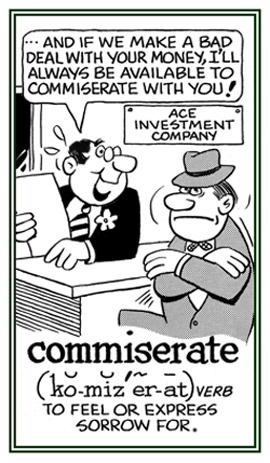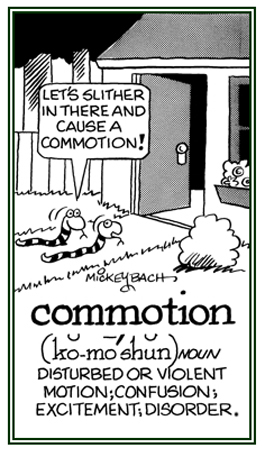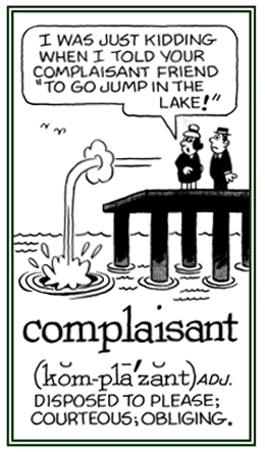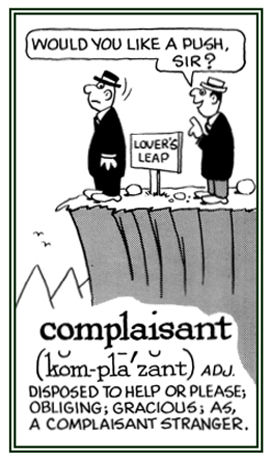com-, co-, cog-, col-, con-, cor-
(Latin: together, together with, with)
The prefix com- is assimilated to co- before h, w, and all vowels:
The prefix com- becomes, cog- before g: cognition, [co + gnoscere, "to know"], et al.
The prefix com- becomes, col- before l: colloquial, et al.
The prefix com- becomes, con- before c, d, g, j, n, q, s, t, v: covivant, et al.
The prefix com- becomes, cor- before r: corrigible, et al.
The words for this unit show cartoons for all of the examples of the com-, co-, cog-, col-, con-, cor- entries; however, there are many more of them which exist in other units which are available when you type in a particular word in the search box at the bottom of this page.
1. A courtesy and friendly behavior with others: The comity among the workers in Jane's office promoted a peaceful relationship which resulted in greater achievements for the business.
2. An association of independent countries formed for their mutual benefit: A comity of nations includes a respectful recognition accorded by one nation for the laws and institutions of another one.
3. An environment of social amicability: There was almost a complete comity, courtesy, and civility among the members of the family, except for Jane, who always had something to criticize or to complain about!
4. Etymology: borrowed from Latin comitas, "friendliness"; possibly from Old Latin cosmis which some believe to derive from co-, "with, together" + -smis, "smile".

© ALL rights are reserved.
Go to this Word A Day Revisited Index
2. An association of independent countries formed for their mutual benefit: A comity of nations includes a respectful recognition accorded by one nation for the laws and institutions of another one.
3. An environment of social amicability: There was almost a complete comity, courtesy, and civility among the members of the family, except for Jane, who always had something to criticize or to complain about!
4. Etymology: borrowed from Latin comitas, "friendliness"; possibly from Old Latin cosmis which some believe to derive from co-, "with, together" + -smis, "smile".
In Middle English, comite, "an association", came from Latin comitas, "friendliness".

Go to this Word A Day Revisited Index
so you can see more of Mickey Bach's cartoons.
commensurate (adjective); more commensurate, most commensurate
1. Descriptive of a correspondence in duration or size: The two pairs of shoes that Sam bought are quite commensurate because both pairs fit his feet!
2. Characterizing the equivalent in amount, value, or degree; proportionate: The excellent grade Joan received on her essay was commensurate with the quality of work that she usually did.
3. Concerning the ability to be calculated by a shared standard: The wages for the workers in the firm in one country are commensurate with those employees who are paid by the same company in a different nation; which means that they are determined by the same method of computations or assessments.

© ALL rights are reserved.

© ALL rights are reserved.
Go to this Word A Day Revisited Index
2. Characterizing the equivalent in amount, value, or degree; proportionate: The excellent grade Joan received on her essay was commensurate with the quality of work that she usually did.
3. Concerning the ability to be calculated by a shared standard: The wages for the workers in the firm in one country are commensurate with those employees who are paid by the same company in a different nation; which means that they are determined by the same method of computations or assessments.


Go to this Word A Day Revisited Index
so you can see more of Mickey Bach's cartoons.
1. A person whose job is to analyze and make remarks on sports, competitions, performances, and other events: The weather commentator on TV said that the forecast for the next day would be sunny and warm, but it actually turned out to be windy and cold!
2. Etymology: from Latin commentatus, past participle of commentari, "to consider, to think about, to explain"; from com, "with, together" + mentis, "mind".

© ALL rights are reserved.
Go to this Word A Day Revisited Index
2. Etymology: from Latin commentatus, past participle of commentari, "to consider, to think about, to explain"; from com, "with, together" + mentis, "mind".

Go to this Word A Day Revisited Index
so you can see more of Mickey Bach's cartoons.
commiserate (kuh MIZ uh rayt") (verb), commiserates; commiserated; commiserating
1. To feel compassion for; to express sorrow, sadness, or pity for anyone who has experienced something unpleasant; to lament or to express grief about: Janine commiserated with Vance regarding the terrible injuries that he had suffered in the car accident.

© ALL rights are reserved.

© ALL rights are reserved.

© ALL rights are reserved.
Go to this Word A Day Revisited Index
Friends called Devon to commiserate with him when they heard that he had to have a triple by-pass operation.
2. Etymology: from Latin com, "with" + miseror, "pity".


Go to this Word A Day Revisited Index
so you can see more of Mickey Bach's cartoons.
commodious (adjective), more commodious, most commodious
1. Pleasantly spacious or large and roomy: Some movie theaters now have more commodious seats for viewers with better padding and wider spaces.
2. Generous or large in area or extent: Ellen and Ted were so happy to be able to move into a commodious apartment with four rooms after living in a modest, simple, and tiny place for more than a year.
3. Etymology: "beneficial, convenient", from Medieval Latin commodiosus, "convenient, useful", from Latin commodus, "proper, fit, appropriate, convenient, satisfactory"; from com-, "together, together with" + modus, "measure, manner".

© ALL rights are reserved.

© ALL rights are reserved.
Go to this Word A Day Revisited Index
2. Generous or large in area or extent: Ellen and Ted were so happy to be able to move into a commodious apartment with four rooms after living in a modest, simple, and tiny place for more than a year.
3. Etymology: "beneficial, convenient", from Medieval Latin commodiosus, "convenient, useful", from Latin commodus, "proper, fit, appropriate, convenient, satisfactory"; from com-, "together, together with" + modus, "measure, manner".


Go to this Word A Day Revisited Index
so you can see more of Mickey Bach's cartoons.
1. Something useful that can be turned into future advantages: Grace’s outstanding talent of painting landscapes turned out to be her best commodity, because, after finishing her studies, she was able to earn a good living by being an artist!
2. An article of trade or commerce; especially, an agricultural or mining product which can be processed and resold: Oil, being a mineral people cannot live without in this present age, is a highly valued commodity because its price generally keeps getting higher.
3. Etymology: in the 15th century, "benefit, profit, welfare"; later "a convenient or useful product"; from Middle French commodité, "benefit, profit"; from Latin commoditatem, commoditas, "fitness, adaptation, convenience, advantage"; from commodus, "suitable, convenient"; and ultimately from com-, "with, together" + modus, "measure, manner".

© ALL rights are reserved.
Go to this Word A Day Revisited Index
2. An article of trade or commerce; especially, an agricultural or mining product which can be processed and resold: Oil, being a mineral people cannot live without in this present age, is a highly valued commodity because its price generally keeps getting higher.
3. Etymology: in the 15th century, "benefit, profit, welfare"; later "a convenient or useful product"; from Middle French commodité, "benefit, profit"; from Latin commoditatem, commoditas, "fitness, adaptation, convenience, advantage"; from commodus, "suitable, convenient"; and ultimately from com-, "with, together" + modus, "measure, manner".

Go to this Word A Day Revisited Index
so you can see more of Mickey Bach's cartoons.
1. A state of confusion and noisy disturbances: Shirley was upset by all of the commotion that was going on across the street from her house where they were having a late party.
2. Etymology: from Latin com-, "together" + movere, "to move".

© ALL rights are reserved.
Go to this Word A Day Revisited Index
2. Etymology: from Latin com-, "together" + movere, "to move".

Go to this Word A Day Revisited Index
so you can see more of Mickey Bach's cartoons.
A dispatch or an account of information typically sent in haste to a recipient: Adam received a communiqué from his daughter to tell him that her passport had been stolen.

© ALL rights are reserved.
Go to this Word A Day Revisited Index

Go to this Word A Day Revisited Index
so you can see more of Mickey Bach's cartoons.
1. A quality of the humane understanding for the suffering of others and wanting to do something to help them: It was due to Katherine's deep compassion for the pain and suffering of small animals that helped her decide to attend veterinary college and become a veterinarian.
2. Etymology: from Latin com-, "together" + pati, "to suffer".

© ALL rights are reserved.
Go to this Word A Day Revisited Index
2. Etymology: from Latin com-, "together" + pati, "to suffer".

Go to this Word A Day Revisited Index
so you can see more of Mickey Bach's cartoons.
compatible (adjective), more compatible, most compatible
1. Referring to people who get along well together in agreement or harmony; rapport: The two friends, Janet and Mary, were very compatible and so they often spent their holidays together.

© ALL rights are reserved.
Go to this Word A Day Revisited Index
Jack and Sally loved and trusted each other believing that they could have a compatible marriage with an amicable relationship.
2. Regarding an adaptability for simple and effortless interaction: Jane had to get a new printer because her old one wasn't compatible with her new computer.
Go to this Word A Day Revisited Index
so you can see more of Mickey Bach's cartoons.
compensate (verb), compensates; compensated; compensating
1. To make a payment to or to provide something of value to another person in return for work or for a service that has been done: Jack and Mary were compensated for taking care of the neighbor's garden and lawn while the family was away on vacation.
2. To provide something good as a reward for anything else that is bad or undesirable in order to make up for a defect or weakness: The price of the book that Karen bought was reduced because its cover was torn; so, the store was compensating for the damage with a lower price.
3. To counterbalance; to offset; to be equivalent to: Shirley compensated her lack of beauty with great personal charm and intelligence.
4. Etymology: from Latin compensatus, formed from the verb compensare, "to weigh one thing (against another)"; therefore, "to counterbalance"; from com-, "with" + pensare, a form of pendere, "to weigh".

© ALL rights are reserved.
Go to this Word A Day Revisited Index
2. To provide something good as a reward for anything else that is bad or undesirable in order to make up for a defect or weakness: The price of the book that Karen bought was reduced because its cover was torn; so, the store was compensating for the damage with a lower price.
3. To counterbalance; to offset; to be equivalent to: Shirley compensated her lack of beauty with great personal charm and intelligence.
4. Etymology: from Latin compensatus, formed from the verb compensare, "to weigh one thing (against another)"; therefore, "to counterbalance"; from com-, "with" + pensare, a form of pendere, "to weigh".

Go to this Word A Day Revisited Index
so you can see more of Mickey Bach's cartoons.
The feeling of being overly self-satisfied, which some people have when they are content with themselves and their situations: The new student was aware of the smugness or complacence of some of the rich kids at the private school.

© ALL rights are reserved.
Go to this Word A Day Revisited Index

Go to this Word A Day Revisited Index
so you can see more of Mickey Bach's cartoons.
A feeling of smugness or excessive satisfaction with oneself or one's achievements: As far as some of his fellow workers were concerned, Karl's complacency as the best salesman was absolutely disgusting.

© ALL rights are reserved.
Go to this Word A Day Revisited Index

Go to this Word A Day Revisited Index
so you can see more of Mickey Bach's cartoons.
complacent (adjective), more complacent, most complacent
1. Contented with oneself to a fault; that is, self-satisfied and unconcerned: Ever since Cain received his raise, he has been the most complacent person in the office and he doesn't do as much work as he did before.
2. Self-satisfied and unaware of possible dangers: Too many people were complacent when there was a strong economy, but that attitude has changed now that the economy has gone in the other direction.

© ALL rights are reserved.
Go to this Word A Day Revisited Index
2. Self-satisfied and unaware of possible dangers: Too many people were complacent when there was a strong economy, but that attitude has changed now that the economy has gone in the other direction.

Go to this Word A Day Revisited Index
so you can see more of Mickey Bach's cartoons.
complaisant (adjective), more complaisant, most complaisant
Relating to someone who is very willing to please others; obedient and agreeable to do what others are suggesting: Jackie was very obliging and complaisant when she was asked by the disabled lady to help her go across the street.

© ALL rights are reserved.

© ALL rights are reserved.

© ALL rights are reserved.
Go to this Word A Day Revisited Index





